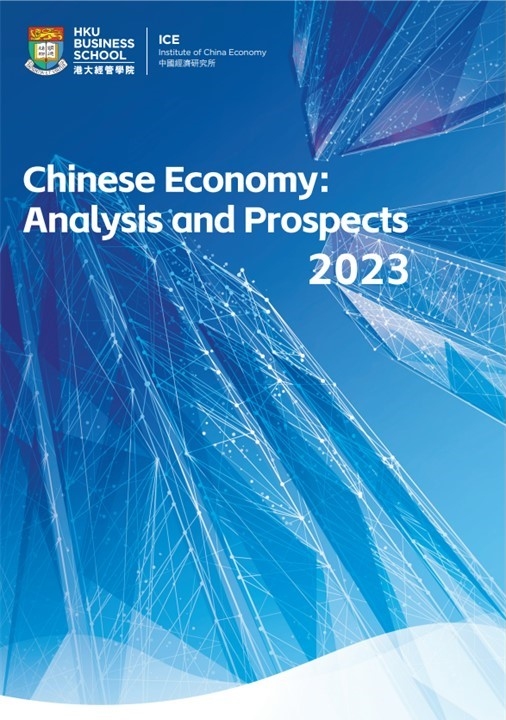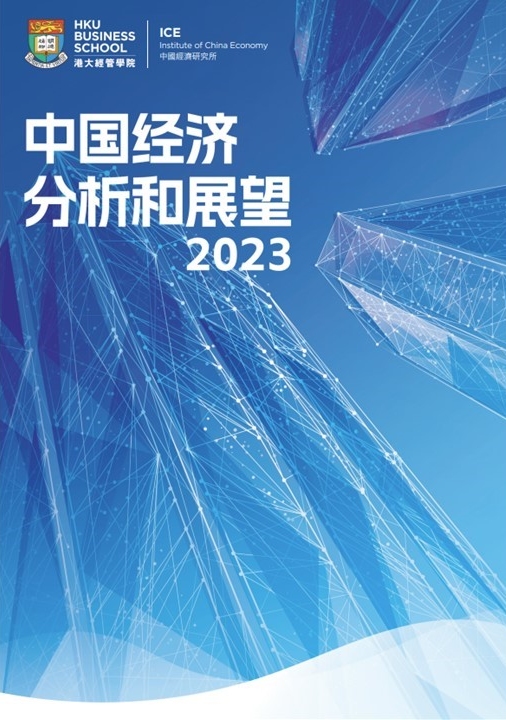Chinese Economy: Analysis and Prospects – 2023
Report
Chinese Economy: Analysis and Prospects – 2023
中国经济分析和展望 – 2023
Authors
Professor Zhenhua Mao, Professor Shusong Ba, Dr. Bokun Niu, Professor Xiaodong Zhu, Dr. Jie Gong, Professor Jin Li, Dr. Guojun He, Dr. Hongsong Zhang, Dr. Heng Chen
Information
Year of Publication: 2023
Location of Publication: Hong Kong SAR, China (People’s Rep. of)
Languages: English
Pages of Text: 121
Preface
In the midst of a century-long unprecedented transformation, the global political and economic landscape has been constantly changing, with technological advances at an incredible pace. Enormous challenges and opportunities are intertwined, and the future of the global economy is unpredictable. As the world’s second-largest economy, China has long been a major contributor to the growth of global economy, and it remains crucial to the stability and growth of the global economy. However, after reaching the middle-income level, the complexity of the Chinese economy has been increasing constantly, and China faces more arduous challenges than ever before to maintain a sustainable economic growth. In such a context, it is particularly urgent for the academic community to conduct in-depth and meticulous research on the Chinese economy, to systematically understand its growth trends, and to comprehend its challenges and potential.
HKU Business School is committed to becoming a world-class academic centre for research on the Chinese economy. It has always adhered to an academicoriented philosophy, has established a faculty team with a level of international academic standards, and continuously seeks to expand and develop further. In 2022, the “HKU Institute of China Economy” was established to provide a platform for experts around the world to exchange ideas on Chinese economy in order to promote in-depth research on the Chinese economy. The institute will support various academic research, organize various academic exchanges, and plan to hold the annual “Conference on China and Global Economy” and the “HKU Forum on Chinese Economy”. In addition, the institute will publish the annual report “Chinese Economy: Analysis and Prospects”, which will compile research results on important issues facing the Chinese economy each year. The annual report is not intended to make a comprehensive outlook or forecast on the Chinese economy for that year, nor is it intended to cover all important issues in the Chinese economy. The report aims to provide new perspectives and understanding of important issues in the Chinese economy through rigorous academic analysis and independent judgment.
“Chinese Economy: Analysis and Prospects – 2023” is the first issue of this annual report. In 2022, the Chinese economy faced unprecedented pressure, due to reasons such as the COVID-19 pandemic, the Russia-Ukraine conflict, and the Fed rate hikes. In the midst of the continued uncertainty of the global economic and financial situation, the new government in China has just established this year’s economic policy priorities at the 2023 Two Sessions, striving to achieve stable economic growth. The goal is clear and ambitious, but the challenges and problems are obviously very difficult. This report collects research results from several professors at HKU Business School, analyzing key issues related to macroeconomics, finance, growth, employment, environmental protection, investment, and entrepreneur confidence. The aim is to bring inspiration and reflection to understanding the current situation of the Chinese economy as well as its future prospects.
In Chapter 1 of the report, Professor Zhenhua Mao analyzes the current situation and future prospects of China’s macroeconomy after the COVID pandemic. The article first analyzes the reasons why in 2022 China’s economic recovery was twice hindered, resulting in a lower GDP growth than expected. Then, it reviews the multiple domestic and international challenges that China’s economy will face in 2023. In particular, it emphasizes the need to monitor the evolution of the balance sheet in the non-financial sector, beware of the risk of balance sheet recession, and give high priority to policies that help maintain sustainable growth in the context of declining potential growth rate. In
Chapter 2, Professor Shusong Ba and Dr. Bokun Niu summarized the challenges and progress that the Chinese financial system has made since 2022 in areas such as exchange rate fluctuations, credit, real estate finance, stock market registration system reform, and RMB internationalization. They analyzed the main issues facing the Chinese financial system in 2023 and the direction for reforms. They particularly pointed out that the J-curve effect after the pandemic is expected to trend towards relative calm, and credit growth will still be constrained by the impact of the adjusting pandemic policy on the supply side. They also emphasize that we should not ignore the mid-term expectation of slow recovery and other scar effects.
In Chapter 3, Professor Xiaodong Zhu explored the evolution of China’s long-term economic growth rate. China’s GDP growth rate has been in a downward trend for the past 15 years. It has fallen all the way to less than 6% in 2019, from a high growth rate of over 13% in 2007. The article analyzed the reasons for the decline in China’s economic growth rate by exploring the driving forces behind China’s longterm economic growth over the past 15 years and predicted the trend of economic growth in the next decade. The article argues that raising productivity growth is crucial for China’s future growth, and more decentralization and bottom-up policy changes are the key to raising China’s productivity growth. The COVID-19 pandemic has lasted for three years and has had a significant negative impact on youth employment. This impact will have a more lasting effect on their future career development and income through its influence on human capital accumulation.
In Chapter 4, Professor Jin Li and Dr. Jie Gong focused on post-pandemic youth employment and career development issues. They search for effective policy measures to promote human capital accumulation and improve labour market matching, in order to promote young workers’ post-pandemic career development.
In Chapter 5, Dr. Guojun He reviewed China’s achievements in pollution control since 2013 and discussed potential future environmental protection policies. The article believes that China’s future environmental regulation intensity will be relaxed at the margin. Meanwhile, pollution control measures will also shift from end-of-pipe treatment (air pollutants) to source control (carbon reduction) that is mainly based on industrial structure upgrading and energy structure adjustment. The article also made five recommendations for China’s future environmental policy.
In Chapter 6, Dr. Hongsong Zhang analyzed the impact of the COVID-19 pandemic on China’s fixed asset investment and economic growth. The article attempted to analyze the short- and long-term impact of the COVID pandemic on China’s fixed asset investment and economic growth, by comparing the impact of the 2008 global financial crisis on China’s economy. The article aims to provide a reference for effective policy responses to mitigate the negative impact of COVID pandemic. The article suggests that the key to recover the growth of fixed asset investment is to restore the confidence of consumers and investors, as well as reducing investment frictions in the economy.
The key to restarting the economy in the post-pandemic era is to restore confidence in the private sector. What are the obstacles to the recovery of entrepreneur confidence currently? In the final chapter of this report, Dr. Heng Chen conducted a large-scale survey of entrepreneurial confidence and living status, and conducted an in-depth analysis of the factors affecting entrepreneur confidence. One inspiring finding is that China’s foreign relations are an important factor in determining entrepreneurs’ confidence in China’s economic prospects.
Professor Hongbin Cai Dean and Chair of Economics, HKU Business School
Director, Institute of China Economy, HKU


